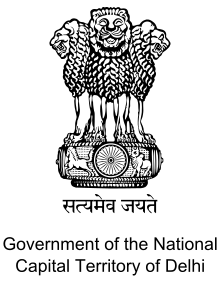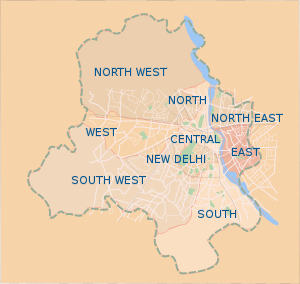Government of Delhi
New Delhi, an urban area in Delhi Union Territory, is the seat of the State Government of Delhi and the Government of India, as well as the city or local governments as per the 74th Constitutional Amendment Act[1].
 | |
| Seat of Government | New Delhi |
|---|---|
| Executive | |
| Governor | Lt. Governor Anil Baijal |
| Chief Minister | Arvind Kejriwal |
| Deputy Chief Minister | Manish Sisodia |
| Chief Secretary | Vijay Kumar Dev, IAS |
| Legislature | |
| Assembly |
|
| Speaker | Ram Niwas Goel |
| Deputy Speaker | Rakhi Birla |
| Members in Assembly | 70 |
| Judiciary | |
| High Court | Delhi High Court |
| Chief Justice | Dhirubhai Naranbhai Patel |
Union Territories are governed by the Union Government. There are a few exceptions, such as Delhi, Puducherry, and erstwhile Jammu and Kashmir which also have a state government[2].
Local Governments
The local or city government is headed by the Mayor. The erstwhile Municipal Corporation of Delhi (MCD) handled civic administration for the city, and had one mayor[3].
The Municipal Corporation of Delhi was replaced by three new bodies, the North Delhi Municipal Corporation (NDMC), the South Delhi Municipal Corporation (SDMC) and the East Delhi Municipal Corporation (EDMC) in 2012[4]. This is why Delhi now has three mayors[3].
The Delhi Cantonment Board is also a municipality that has jurisdiction in the city, since cantonment boards are municipalities as per the Cantonment Board Act 2006 and are under control of the Ministry of Defence[5].
State Government
The Chief Minister and Governor are the heads of the State Government. The state government consists of the legislative wing, i.e. the present Legislative Assembly of Delhi, which is unicameral, consisting of 70 members of the legislative assembly (MLA).

History
The Legislative Assembly of Delhi was first constituted on 17 March 1952 under the Government of Part C States Act, 1951, but it was abolished on 1 October 1956. Its legislative assembly was re-established in the year of 1993, after the Constitution (Sixty-ninth Amendment) Act, 1991 came into force, followed by the Government of National Capital Territory of Delhi Act, 1991 the Sixty-ninth Amendment to the Constitution of India, declared the Union Territory of Delhi to be formally known as National Capital Territory of Delhi.[6]
The first Chief Minister (CM) of Delhi was Ch. Braham Prakash (INC) and the first woman CM was Sushma Swaraj of BJP. Sheila Dikshit (INC) has been the CM for the maximum times (three) and oversaw immense development of the city during her tenure. New Delhi owes much of its growth to her tenure. Guru Radha Kishan (CPI) had the rare distinction of representing his constituency in MCD (DMC initially) for most years continuously by an individual and Ch. Prem Singh (INC) has won the maximum elections for different civic bodies in Delhi.
Ministers
As per article 239AA of Indian Constitution, the number of Ministers cannot exceed ten percent of Delhi assembly seats. Therefore, there can be a maximum of 7 Ministers(10% of 70 Delhi assembly seats)[7]
| # | Term Start | Term End | Name | Departments and portfolios |
|---|---|---|---|---|
| 01 | 14 February 2015 | Incumbent | Arvind Kejriwal | Chief Minister, Water |
| 02 | 14 February 2015 | Incumbent | Manish Sisodia |
Deputy Chief Minister, Tourism, Education, Finance, Planning, Land & Building, Vigilance, Services, Women & Child, Art, Culture & Languages And all other departments not specifically assigned to any ministers |
| 03 | 14 February 2015 | Incumbent | Satyendra Kumar Jain |
Health, Industries, Public Works Department, Power, Home, Urban Development |
| 04 | 14 February 2015 | Incumbent | Gopal Rai |
Employment, Development, Labour, General Administration Department, Irrigation & Flood Control |
| 05 | 14 February 2015 | Incumbent | Imran Hussain |
Food and Supply, Election |
| 06 | 14 February 2015 | Incumbent | Rajendra Pal Gautam |
Gurudwara Elections, Water, SC & ST, Social Welfare, Cooperative |
| 07 | 14 February 2015 | Incumbent | Kailash Gahlot |
Administrative Reforms, Information & Technology, Law, Justice & Legislative Affairs, Transport, Revenue, Forest & Wildlife, Environment |
Central Government
The Lieutenant Governor of Delhi is appointed by the President of India.[10] , as agent of President and not head of state like governor, on the advice of the Central government. This union government is called the Government of the National Capital Territory of Delhi (Government of NCT of Delhi or simply Government of Delhi). It consists of an executive, led by the Lieutenant Governor of Delhi, a judiciary and a legislature.
Central versus State
The Supreme Court of India in Government of NCT of Delhi v. Union of India ruled that according to the Article 239AA of the Indian constitution, that although the government had to keep him/her informed of its decisions, Delhi's lieutenant governor did not have any independent decision-making powers and had to follow the "aid and advice" of the chief minister-led council of ministers of the Government of Delhi on matters which the Delhi Legislative Assembly could legislate on, viz., all items on the State List (items on which only state legislatures can legislate) and the Concurrent List (items on which both the Parliament of India and the state legislatures can legislate) barring 'police, 'public order' and 'land'.[11][12][13][14][15][16] The court added that on matters referred to him/her, the LG was bound to follow the orders of the president.[13]
Judiciary
The Delhi High Court has jurisdiction over Delhi, which also has two lower courts: the Small Causes Court for civil cases, and the Sessions Court for criminal cases. Unlike other states in India, the Delhi Police reports to the Ministry of Home Affairs, Government of India and not the state government. Headed by the Police Commissioner, it is one of the largest metropolitan police forces in the world.[17] The headquarters of Delhi Police are located at ITO.
See also
References
- Idiculla, Mathew (14 June 2018). "The missing tiers". The Hindu. ISSN 0971-751X. Retrieved 2 July 2020.
- DelhiAugust 5, India Today Web Desk New; August 6, 2019UPDATED:; Ist, 2019 11:38. "What is the difference between a state and a union territory?". India Today. Retrieved 2 July 2020.CS1 maint: extra punctuation (link) CS1 maint: numeric names: authors list (link)
- "Baffling situation of one city, three mayors". Hindustan Times. 19 April 2012. Retrieved 2 July 2020.
- "Department of Law, Justice & Legislative Affairs". web.archive.org. 24 March 2017. Retrieved 2 July 2020.
- "THE CANTONMENTS ACT, 2006" (PDF). web.archive.org. 31 May 2014. Retrieved 2 July 2020.
- THE CONSTITUTION (Sixty-ninth Amendment) Act, 1991
- "Special provisions with respect to Delhi".
- "Six Ministers sworn in". The Hindu. Retrieved 21 February 2015.
- "Arvind Kejriwal's cabinet". The Wall Street Journal. Retrieved 21 February 2015.
- "The Constitution of India" (PDF).
- Roy, Shreyashi (4 July 2018). "Can Statehood for Delhi Solve the LG vs AAP Power Tussle?". The Quint. Retrieved 24 September 2018.
- Rajagopal, Krishnadas; Singh, Soibam Rocky (4 July 2018). "Lieutenant Governor bound by 'aid and advice' of elected Delhi govt., rules Supreme Court". The Hindu. New Delhi: N. Ram. ISSN 0971-751X. OCLC 13119119. Retrieved 24 September 2018.
- Mustafa, Faizan (5 July 2018). "Delhi power tussle: Between the Supreme Court's lines". The Indian Express. New Delhi: Indian Express Group. OCLC 70274541. Retrieved 24 September 2018.
- "Supreme Court to Delhi LG: Don't play decision-maker or obstructionist". The Telegraph. TT Bureau. Agencies. 4 July 2018. OCLC 271717941. Retrieved 24 September 2018.CS1 maint: others (link)
- Prakash, Satya (4 July 2018). "SC verdict on power tussle in Delhi explained". The Tribune. Retrieved 25 September 2018.
- "Supreme Court verdict on AAP government vs Delhi LG: Key points". The Times of India. TIMESOFINDIA.COM. Bennett, Coleman & Co. Ltd. 4 July 2018. OCLC 23379369. Retrieved 25 September 2018.CS1 maint: others (link)
- "History of Delhi Police". Delhi Police Headquarters, New Delhi, India. Archived from the original on 7 December 2006.